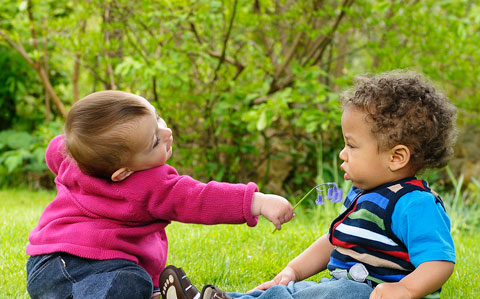Children who can understand and comfort others make friends more easily and are better at being friends than children who can’t. “Feeling the feelings of others,” or empathy, is an important part of children’s social and emotional development. Showing empathy by caring about others’ feelings is an important part of interacting effectively with others. Parents and caregivers can help young children learn caring behaviors.
How can parents and teachers encourage children’s caring behavior?
- Let children know that hurtful words or actions affect others.
“Look how Jessie felt when you pushed her down. You know how it feels when somebody pushes you down. Please help her up, and let’s talk about how to solve this problem.”
“Bryce looks sad because you knocked down the block tower he had been building. Let’s help him rebuild it.”
- Let children know what behaviors are appreciated and why.
“I am glad you helped Martin pick up his toys. I know he was glad that you helped him. That’s the way to be a good friend.”
“You saw that Sophia was crying when her mom left, so you brought her a tissue and her favorite doll. That lets her know you care.”
- Model empathy.
Children learn from seeing your kindness to others, listening to what you say about others’ problems, and hearing you talk about the feelings of others. “It must have hurt Mrs. Hanson a lot to lose her pet. Let’s go visit and see if we can cheer her up.”
- Provide opportunities for children to work and play together.
Games or activities that emphasize cooperation help children think of the needs and feelings of others as they work toward a common goal. For example, you might introduce games such as cooperative musical chairs and freeze tag or activities such as drawing murals and building block cities.
What gets in the way of children’s caring behavior?
- Some early experiences
For example, babies who have not formed strong attachments to their parents, or who have experienced physical abuse or harsh discipline, may have trouble later on responding to the feelings of others. They may need additional practice to learn empathy.
- Violence on TV, in the movies, online, or in video games
Children who see a lot of violence on the screen may lose their sensitivity to seeing others get hurt. Teachers can recommend programming that does not contain violence.
IEL Resource
- Resource List: Emotional Development


 PDF
PDF